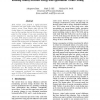Free Online Productivity Tools
i2Speak
i2Symbol
i2OCR
iTex2Img
iWeb2Print
iWeb2Shot
i2Type
iPdf2Split
iPdf2Merge
i2Bopomofo
i2Arabic
i2Style
i2Image
i2PDF
iLatex2Rtf
Sci2ools
222
click to vote
ISCA
2012
IEEE
2012
IEEE
Reducing memory reference energy with opportunistic virtual caching
Most modern cores perform a highly-associative translation look aside buffer (TLB) lookup on every memory access. These designs often hide the TLB lookup latency by overlapping it with L1 cache access, but this overlap does not hide the power dissipated by TLB lookups. It can even exacerbate the power dissipation by requiring higher associativity L1 cache. With today's concern for power dissipation, designs could instead adopt a virtual L1 cache, wherein TLB access power is dissipated only after L1 cache misses. Unfortunately, virtual caches have compatibility issues, such as supporting writeable synonyms and x86’s physical page table walker. This work proposes an Opportunistic Virtual Cache (OVC) that exposes virtual caching as a dynamic optimization by allowing some memory blocks to be cached with virtual addresses and others with physical addresses. OVC relies on small OS changes to signal which pages can use virtual caching (e.g., no writeable synonyms), but defaults to phy...
Related Content
| Added | 28 Sep 2012 |
| Updated | 28 Sep 2012 |
| Type | Journal |
| Year | 2012 |
| Where | ISCA |
| Authors | Arkaprava Basu, Mark D. Hill, Michael M. Swift |
Comments (0)

